Month: April 2024
LGBTQ New Yorkers and electeds urge CB5 to condemn anti-trans education council resolution
April 12, 2024
By: Matt Tracy
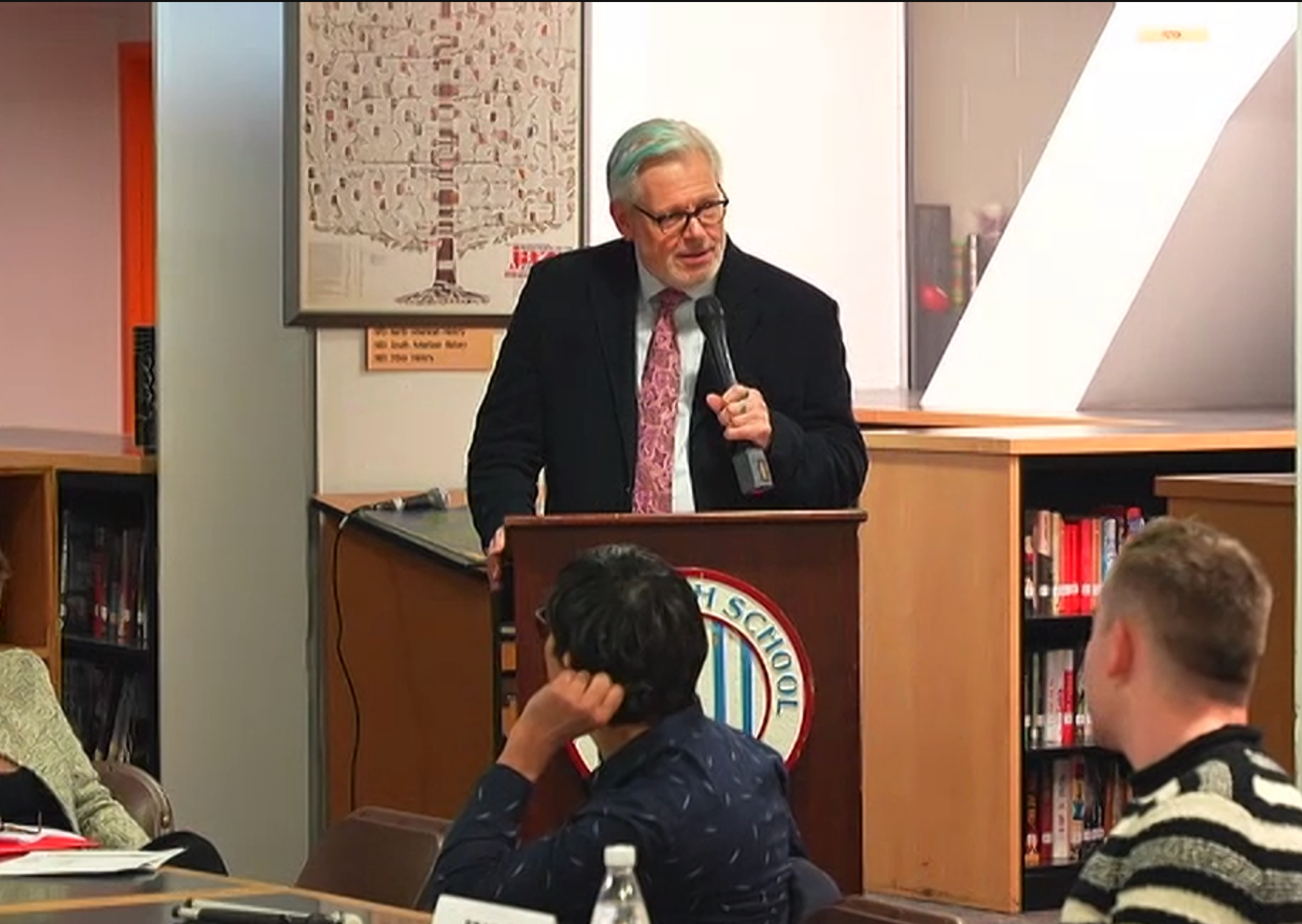
One by one, LGBTQ New Yorkers and elected officials spoke up during Manhattan Community Board 5’s meeting at Xavier High School on April 11 to urge its members to formally condemn an anti-trans sports resolution approved by Community Education Council District 2 (CEC2) last month.
The meeting represented the latest development in the aftermath of CEC2’s widely-criticized March 20 resolution, which called for a new committee that could review and potentially oppose trans inclusion in school sports. The resolution was non-binding and New York education officials have reaffirmed that students can play sports in accordance with their gender identity, but the vote nonetheless sparked concern that the national backlash against trans athletes could gain steam in New York — especially after Nassau County Executive Bruce Blakeman fueled outrage with an executive order barring trans athletes from using sports facilities in the county.
Community education councils, which are separate from the Department of Education, are meant to give members of the public an opportunity to speak out about school-related issues — and some CEC2 schools are located in the same district as Community Board 5, which stretches from 59th Street down to 14th Street between Eighth Avenue and Lexington Avenue. Community boards also play an advisory role and consist of 50 members appointed by the borough president and city lawmakers.
The Stonewall Democratic Club of New York City, a citywide LGBTQ political club, and the statewide education and advocacy non-profit New Pride Agenda showed up in force at Community Board 5’s meeting to encourage members to pass a resolution of their own condemning the education council’s resolution.
“I’m here to profess my profound disappointment in the actions of CEC2 and the resolution that seeks to keep transgender kids from participating in sports aligned with their gender identity,” said Cathy Marino-Thomas, a member of Stonewall and a longtime LGBTQ activist who previously served as the executive director and later the board chair of Marriage Equality NY.
Marino-Thomas called on the board to “take a stand against discrimination” by issuing its own resolution in opposition to the CEC2 vote.
“As a queer mother, I understand the importance of creating an inclusive and supportive environment for our children regardless of their gender identity,” Marino-Thomas said. “Allowing transgender children to have the opportunity to participate in sports teams that align with their gender identity is not only a matter of basic human rights, it is also a crucial step toward fostering a sense of belonging and acceptance.”
Stonewall board member Caleb Simmons, who works in the district, also slammed the resolution, saying such a policy would “rob” trans student-athletes of the “crucial childhood experience of fostering connection and a sense of shared belonging.”
“Please do not allow bigots to hijack prestigious bodies such as yours,” Simmons said.
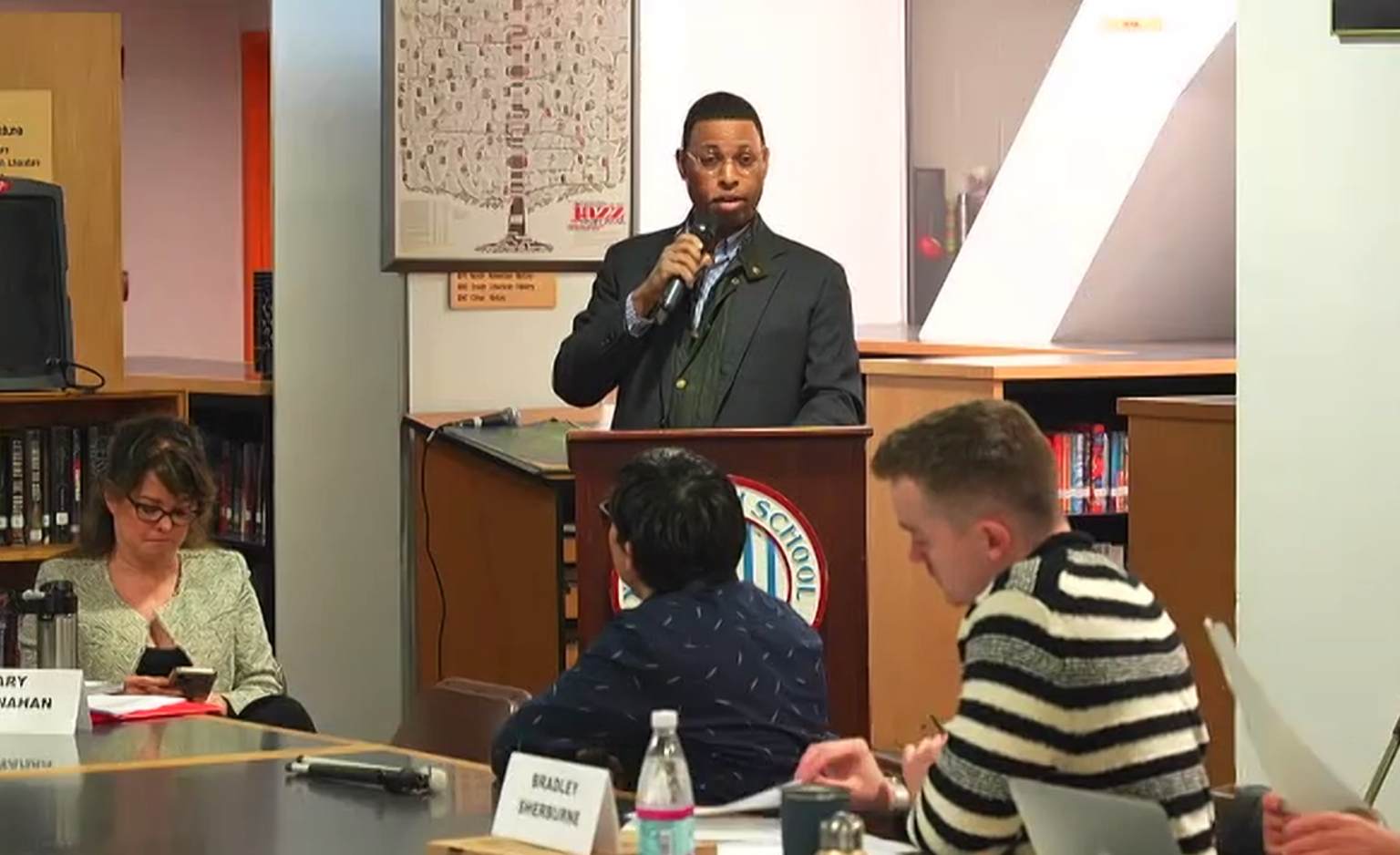
Elisa Crespo, the executive director of New Pride Agenda, joined the meeting virtually to denounce what she described as “a troubling trend that’s happening in our city,” referring to the CEC2 resolution. The resolution, she said, sends a signal to young people — especially trans youth — that they do not belong in sports.
“The fact is that trans youth deserve to play sports that align with their gender identity and the crisis that we’re seeing play out is completely manufactured and not based in fact,” Crespo said. “We in New York City must speak up. We must let anti-trans folks know that it is not OK in New York City.”
Out gay former State Senator Thomas Duane — the first out member of the State Legislature and one of two of the first out members of the City Council — delivered impassioned remarks in support of young trans athletes as he called on the community board to take a strong stand against the CEC2 resolution.
“Whoever wrote this hopes they’ll do damaging things to children,” Duane said before pausing and slowing down for emphasis. “Not allowing children to play sports among people of their gender is wrong, unhealthy, and we’re not in Arizona in the 1800s.”
Duane reminded attendees that he sponsored the Dignity for All Students Act, a law which protects LGBTQ students in New York State, and he pointed to the great deal of research affirming transgender youth as he made his case.
“Every scientific, every psychological association, every psychiatrist, the medical associations, the NIH… all say that those who participate in sport should participate with the gender in which they feel most comfortable,” said Duane, who added that “this issue has been studied to death.”
Duane said he would be in attendance when the board opts to vote on the issue in the future. Samir Lavingia, the chair of Community Board 5, told Gay City News the board does not have a position on CEC2’s resolution and will need to discuss it and vote on it before taking a stance.
“I am speaking to the chair of the relevant committee to discuss the path forward on this item and we are hoping to get this onto the Budget, Education & City Services Committee meeting agenda at the end of the month on April 30,” Lavingia said.
The controversy has brought renewed attention to the backgrounds of some CEC2 members, including Maud Maron, who spoke at a Moms for Liberty event in January and was a sponsor of CEC2’s anti-trans sports resolution. Craig Slutzkin, who is listed as the second vice chair of Community Board 5, is also a listed as member of CEC2. Although the vote breakdown on the anti-trans sports resolution has not been posted publicly, Queens Chronicle reported that Slutzkin, who is president of Townsend Harris High School’s alumni association, has faced backlash from students at that school who signed a petition criticizing his vote in support of the resolution. According to Queens Chronicle, Slutzkin defended his vote by saying that the resolution sought to give “families a safe forum to have respectful yet difficult conversations about how school sports are organized” and that “there was no call for any bans.”
Gabriel Lewenstein, who was elected president of Stonewall earlier this year, told Gay City News on April 12 that members of the political club and New Pride Agenda felt it was important to attend the meeting to ramp up pressure on the board to take action against CEC2’s resolution, which he is concerned could contribute to bullying and harassment against trans youth.
“In Manhattan, the heart of New York City, the birthplace of the modern LGBTQ rights movement, this community supports LGBTQ people and supports trans kids,” said Lewenstein, who added that advocates wanted the board to send a message to trans kids that they are “welcome and allowed to be who they are.”
Elected officials who spoke out against the CEC2 resolution during the meeting included Manhattan Borough President Mark Levine, Manhattan Assemblymember Harvey Epstein, and Manhattan Councilmember Erik Bottcher.
Other community boards are also in the process of developing a response to the CEC2 resolution, including Manhattan’s Community Board 2, which told Gay City News that its Arts, Culture, Education, and School Committee on April 8 voted to recommend a letter in opposition to the resolution. Bottcher also noted that Community Board 4 is working on a resolution in response to CEC2. Community Board 4 could not immediately be reached for comment on April 12.
Research to Document LGBT History of NYC’s Hotel Chelsea Receives Award From National Park Service
April 10, 2024
PRESS CONTACT
Ken Lustbader, NYC LGBT Historic Sites Project
(917) 848-1776 / [email protected]
RESEARCH TO DOCUMENT LGBT HISTORY OF NYC’S HOTEL CHELSEA RECEIVES AWARD FROM NATIONAL PARK SERVICE
Architectural historians and scholars from the NYC LGBT Historic Sites Project receive $25,000 to fund amendment to National Register of Historic Places
NEW YORK, NY—Wednesday, April 10, 2024—The NYC LGBT Historic Sites Project, an award-winning initiative committed to documenting and presenting historic sites connected to the LGBT community throughout New York City, has been awarded $25,000 by the National Park Service as part of its initiative to increase LGBT diversity on the National Register of Historic Places.
Under the auspices of its fiscal sponsor, the Fund for the City of New York, the Project will undertake research to amend the existing National Register of Historic Places nomination for New York City’s Hotel Chelsea to add the LGBT social history to its understanding and appreciation as a nationally-significant historic site.
“We are honored to have the National Park Service continue to support our work to increase LGBT diversity on the National Register of Historic Places. Now more than ever, as the teaching of queer history faces pushbacks across the country, sites like the famed Hotel Chelsea serve as important reminders of the contributions that LGBT people have made to American history and culture. This amendment will officially recognize these contributions by documenting, to date, over 80 notable LGBT artists, writers, musicians, and activists who helped turn the Hotel Chelsea into an internationally recognized icon of New York City.” —Amanda Davis, project manager of the NYC LGBT Historic Sites Project
From the existing entry for the Hotel Chelsea, located at 222 West 23rd Street, at www.nyclgbtsites.org:
The Hotel Chelsea, the storied residence hotel on 23rd Street, has played host to a succession of countercultures throughout the 20th century, serving as a hub and inspiration for the Beat Generation, Postmodern artists, rock and punk musicians, drag performers, and the Club Kids. Until 2011, when new developers evicted many long-term residents and began controversial decade-long renovations, the Chelsea was a creative sanctuary that fostered collaboration among numerous LGBT writers, musicians, artists, designers, filmmakers, and actors such as:
- Stormé DeLarverie, a biracial singer, male impersonator, activist, and bouncer
- Charles James, widely regarded as the first American couturier and one of the most influential women’s fashion designers of the 20th century
- Lance Loud, a TV personality, journalist, and punk rock musician who emerged as a public gay figure after his momentous coming out on America’s first reality television series, An American Family, in 1973
- Ching Ho Cheng, an openly gay Chinese-American artist who depicted his rooms at the Chelsea in a series of gouache still-life paintings
- Sarah Bernhardt, a 19th century French actress, fashion icon, and businesswoman who was one of the world’s first celebrities
- Robert Mapplethorpe, a highly influential photographer of the late 20th century
- Virgil Thomson, an eminent composer and music critic of the 20th century
- Simone de Beauvoir, a French author and feminist who is best known for her treatise, The Second Sex (1949), a classic of feminist literature
- Zaldy Goco, a Filipino-American fashion designer and model
- Frida Kahlo, a Mexican artist best known for her portraits depicting the human body, identity, and deat
Funding comes through the National Park Service’s Underrepresented Communities grant program, which began in 2014 and has provided $7 million to State and Tribal Historic Preservation Offices and Certified Local Governments to work towards diversifying the National Register of Historic Places through surveys and nominations. The Underrepresented Communities grant program is one element of the Historic Preservation Fund, which uses revenue from federal oil and gas leases on the Outer Continental Shelf to assist with a broad range of preservation projects without expending tax dollars, with the intent to mitigate the loss of a nonrenewable resource to benefit the preservation of other irreplaceable resources. Established in 1977, the HPF is authorized at $150 million per year through 2023 and has provided more than $2 billion in historic preservation grants to states, Tribes, local governments, and nonprofit organizations. Administered by the NPS, HPF funds may be appropriated by Congress to support a variety of historic preservation projects to help preserve the nation’s diverse cultural resources. For more information about NPS historic preservation programs and grants, please visit go.nps.gov/grants.
About the NYC LGBT Historic Sites Project
The NYC LGBT Historic Sites Project, launched in 2015 by preservation professionals, is an award-winning cultural heritage initiative and educational resource documenting and presenting historic sites connected to the LGBT community throughout New York City. Its website, including an interactive map, features 450 diverse places from the 17th century to 2000 that are important to LGBT history and illustrate the community’s influence on NYC and American culture.
The project researches and nominates LGBT sites to the National Register, advocates for the official recognition of LGBT historic sites, provides walking tours, presents lectures, engages the community through events, develops educational programs for New York City public school students, and disseminates its content through robust social media channels. Its goal is to make an invisible history visible while fostering pride and awareness.
Web: www.nyclgbtsites.org
Instagram: @nyclgbtsites
Twitter: @nyclgbtsites
Facebook: /nyclgbtsites
About the National Park Service
More than 20,000 National Park Service employees care for America’s 428 national parks and work with communities across the nation to help preserve local history and create close-to-home recreational opportunities. Learn more at www.nps.gov.
Trans Lives Matter: Celebrating international Transgender Day of Visibility with the MTA’s help
March 30, 2024
By: ET Rodriguez
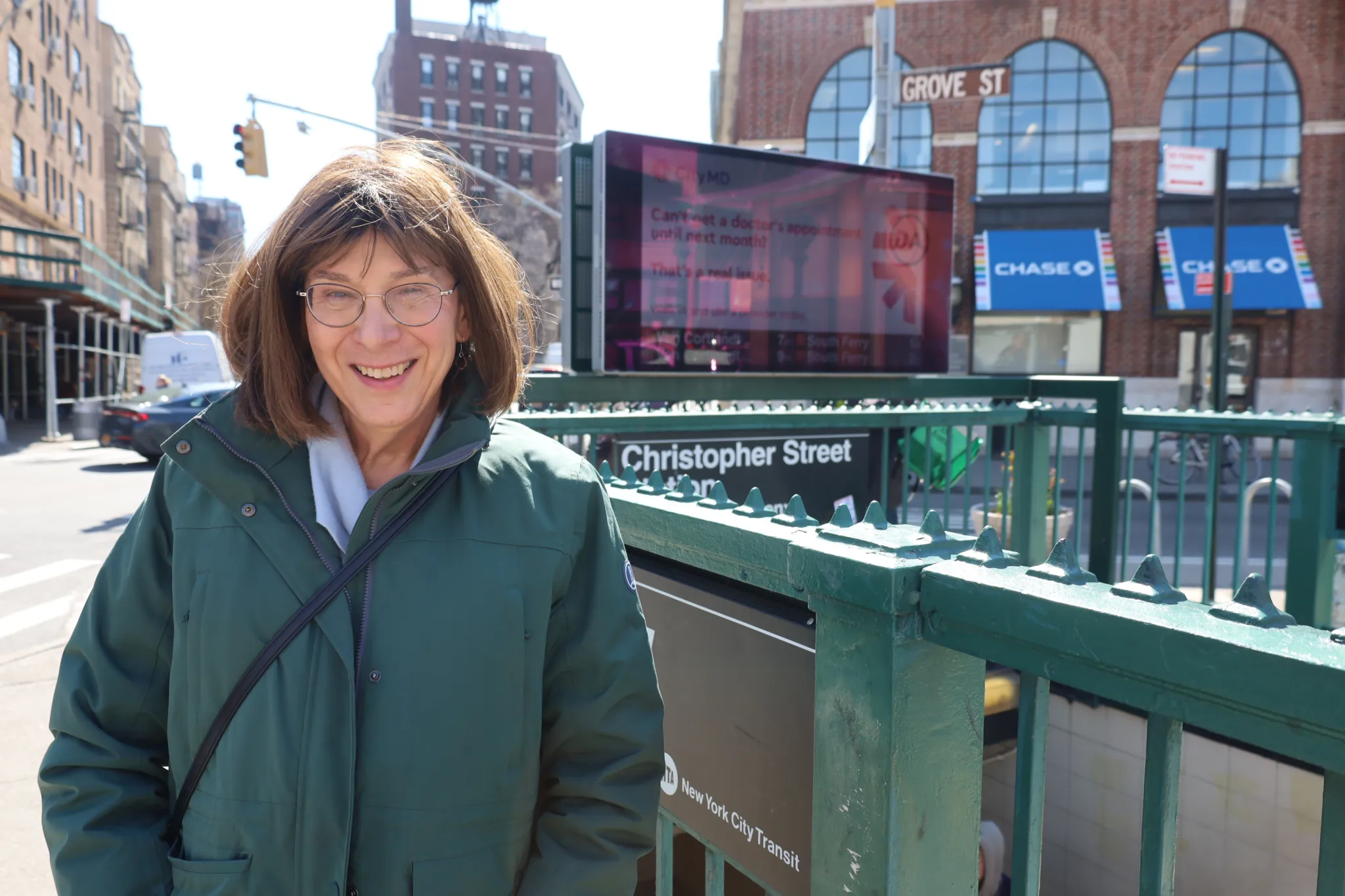
Photo ET Rodriguez
This Sunday, March 31 marks the 16th annual International Transgender Day of Visibility. In celebration, New York City Transit, NYC LGBT Historic Sites Project and the Callen-Lorde Community Health Center joined forces to create a new awareness campaign: “InTransit: Guiding 2.4 million daily riders to respect trans people.”
The initiative will run for a week at the Christopher Street-Sheridan Square train station and features posters directing riders to intransit.nyc. Once on the site, straphangers can learn about trans people in the Big Apple dating back to the 17th Century via the fictitious “T Line.”
The project highlights the stories of 17 NYC landmarks throughout trans history, like the Stonewall monument in Christopher Park and the drag balls at the Imperial Lodge of Elks in Harlem.
“Trans stories existed way before this has become the issue du jour,” said Ken Lustbader, co-director of the NYC LGBT historic sites project. “New York City has been a melting pot of trans lives and we’ve documented that, so there’s no way that that history can be erased.”
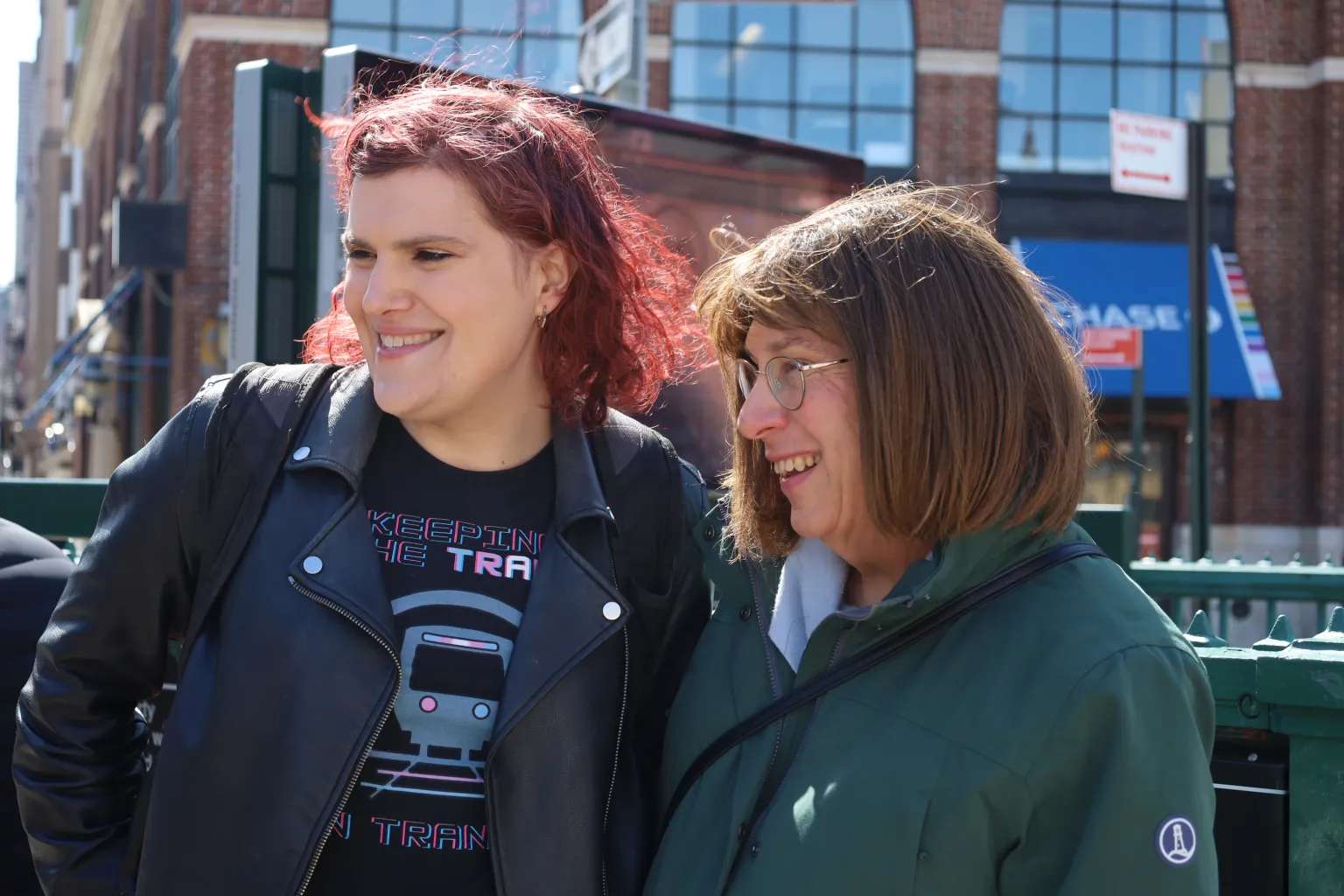
Photo ET Rodriguez
Riders can also tune in to the new podcast mini-series, “InTransit” hosted by the “voice of the subway,” Bernie Wagenblast. The name may not ring a bell, but the voice will as Wagenblast is better known from her booming and ominous announcements warning people to “please stand away from the platform edge.”
Wagenblast came out as transgender on Jan. 1, 2023 and sits down with several guests on the seven-episode podcast to discuss issues trans people face as well as where they can find resources to live happy and healthy lives.
“Visibility is so important because when people see someone that’s different, they come to understand the person — not some stereotype,” Wagenblast told amNewYork Metro. “Hopefully I can increase that visibility.”
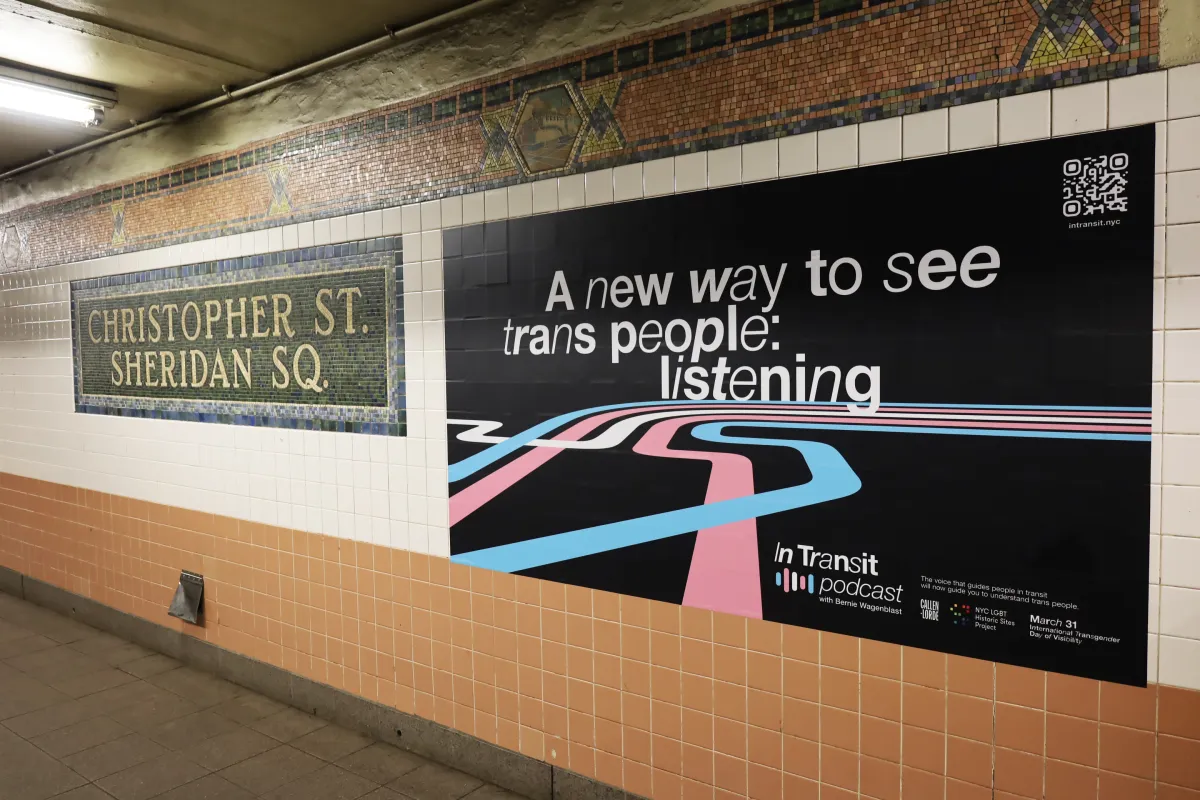
Photo ET Rodriguez
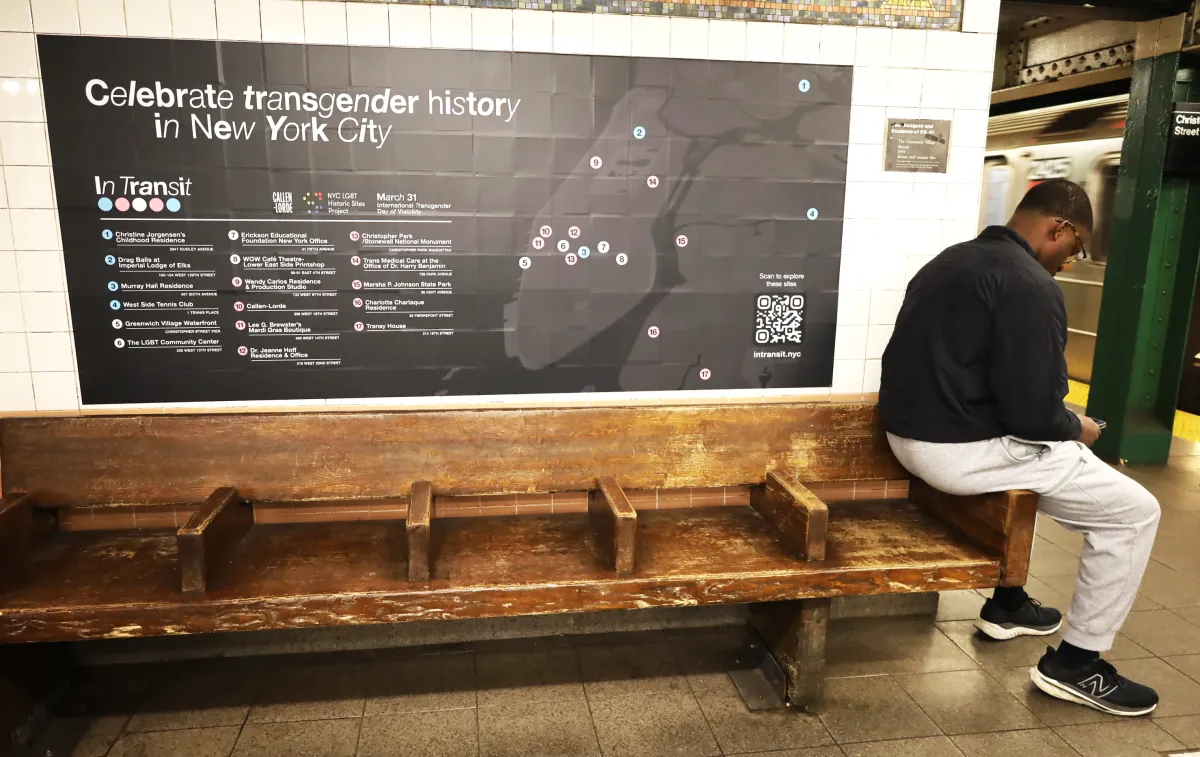
Photo ET Rodriguez
According to the Human Rights Campaign (HRC), 2023 set a record with more than 500 anti-LGBTQ+ bills introduced across the country ranging from banning trans students the right to participate in school sports to banning adults from using restrooms that coincide with their gender identity and scores of anti-LGBTQ+ bills were signed into law. As a result, the HRC declared a national state of emergency for the LGBTQ+ community. But the damage didn’t end there as trans people continue to be the target of hate crimes that turn fatal.
“It’s kind of hard to believe,” said Patrick McGovern, CEO of Callen-Lorde, the leading healthcare provider targeting trans people in NYC. “But we’re seeing similar trends in reproductive rights. We’re losing ground in ways that I don’t think any of us would have thought possible even a few years ago.”
However, McGovern also recognized New York State’s leadership on protecting access to health and ensuring that the state remains a safe haven for the entire LGBTQ+ community.
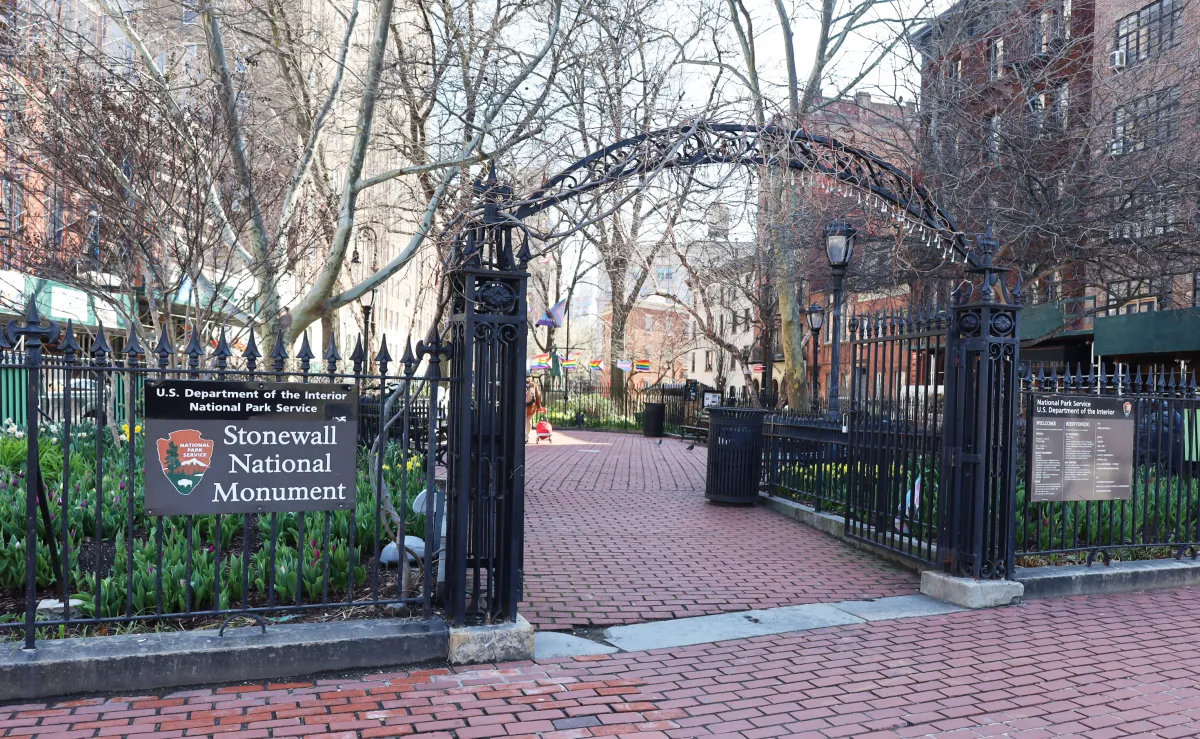
Photo ET Rodriguez
Established in 2009, International Transgender Day of Visibility started to grow legs when Rachel Crandall Crocker was fired from her job as a psychotherapist and lost her marriage after she came out as trans in 1997. But from the ashes rose a phoenix.
“My work wasn’t aware that they were creating a worldwide activist,” Crocker told amNewYork Metro. “If I wasn’t discriminated against so much, I don’t think I ever would have created all the things I did.”
That same year, Crocker co-founded Transgender Michigan, an organization dedicated to providing mental health and resources to trans people. She continued with her activism, but it was the advent of Facebook that helped give her cause a platform when she created a group calling for recognition of transgender people. It took some time to gain traction, but with Crocker’s perseverance, she soon had activists and leaders from around the world reaching out and wanting to join in her effort.
“I wanted a day that we could celebrate being alive,” said Crocker. “The only day we had was the [Transgender] Day of Remembrance [established in 1999] which is when we remembered those who were killed just from being trans.”
Help bring awareness and visibility to the transgender community by visiting intransit.nyc where you can listen to the stories you didn’t know you didn’t know.
And Rachel Crandall Crocker wants to remind everyone, “you don’t have to be perfect to change the world – you just have to be you.”
Bernie Wagenblast, out trans ‘voice of the subway,’ rolls out podcast and visibility campaign
March 29, 2024
By: Donna Aceto & Matt Tracy
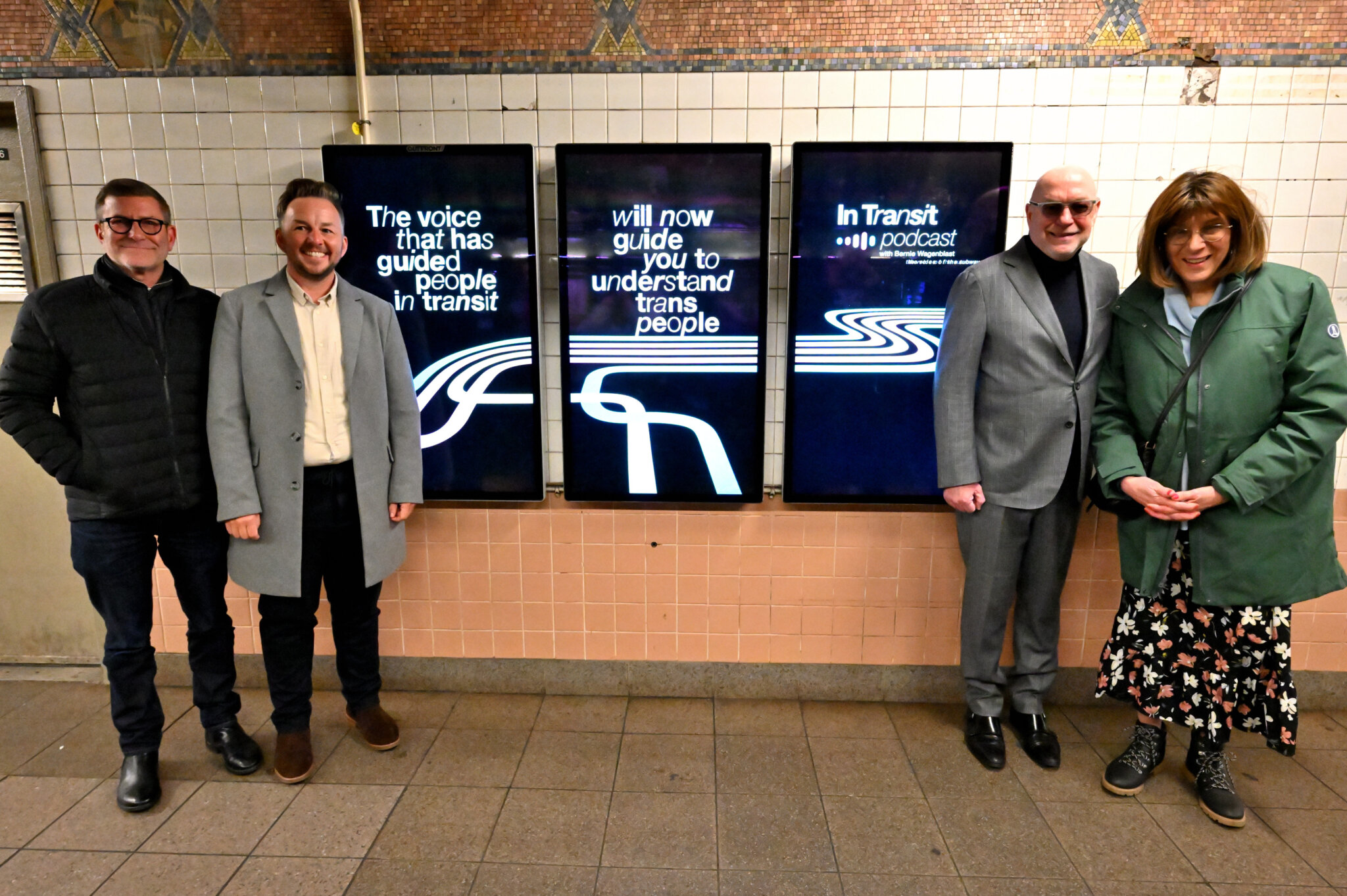
DONNA ACETO
Millions of subway riders have heard Bernie Wagenblast’s voice, but only a small fraction of straphangers know who she is. That’s all about to change!
Wagenblast, who is known as the “voice of the subway” and came out as transgender last year, is stepping into the spotlight for a new transgender awareness campaign that will feature a podcast mini-series, hosted by Wagenblast herself, called “InTransit.”
Up Next – RELATED NEWS: – Roundup of Transgender Day of Visibility events in NYC
The new campaign was announced on March 29 — just in time for International Transgender Day of Visibility on March 31 — at the Christopher Street-Sheridan Square subway station, where the installation includes posters and digital billboards to spread trans-inclusive messages and inform riders about the forthcoming podcast. The podcast — which already has two episodes on Spotify — aims to educate members of the public about gender identity, appropriate language, and more.
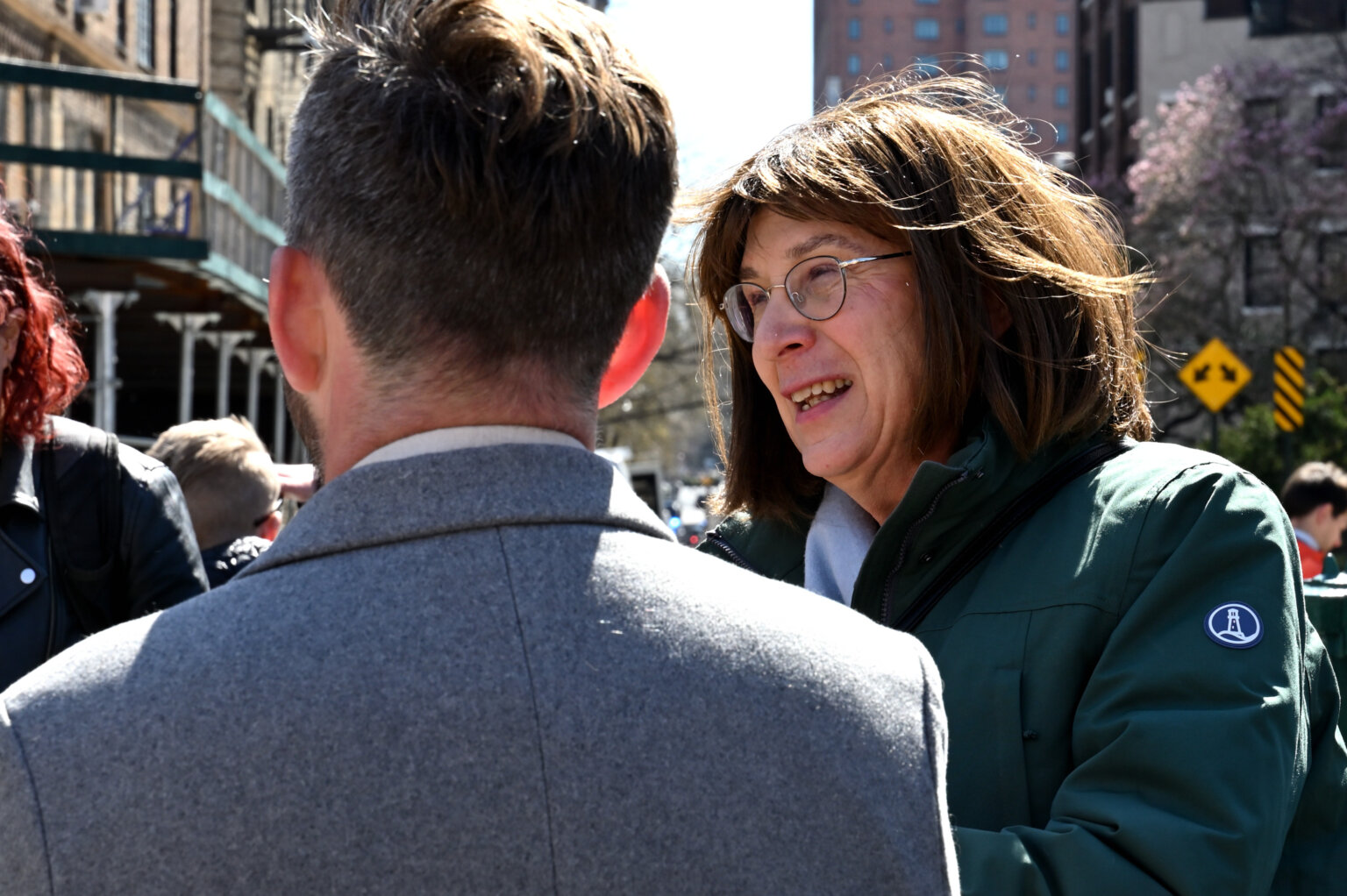
DONNA ACETO
Wagenblast joined stakeholders at the Christopher Street-Sheridan Square station on March 29 to roll out the campaign. AREA 23, a healthcare marketing agency, created the campaign with support from Callen-Lorde Community Health Center and the NYC LGBT Historic Sites Project.
“I know how much visibility matters and I hope, by sharing my story, folks will be reminded that transgender people are a part of their everyday life each time they hear me making an announcement,” Wagenblast said in a written statement announcing the new campaign.
As for the campaign itself, it is hard to miss for any rider passing through the station. In one area of the station, back-to-back-to-back digital screens perched on the wall combine into one animation that reads, “The voice that has guided people in transit will now guide you to understand trans people,” followed by a promotional message previewing the podcast.
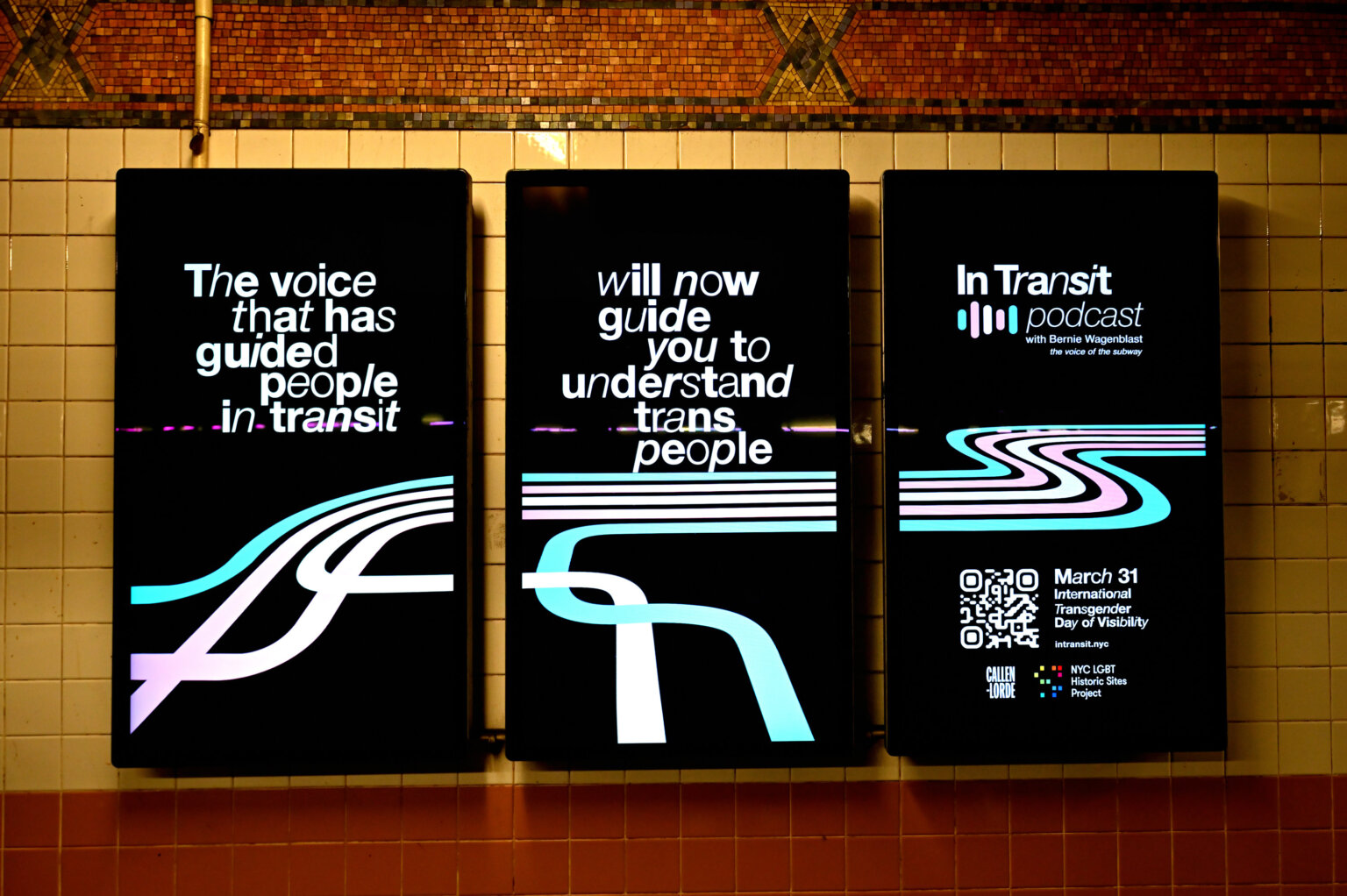
DONNA ACETO
The station also has a billboard painted on the wall, stating, “A new way to see trans people: listening.” The bottom corner of the ad showcases the logo for the podcast, while the top corner features a QR code for easy digital access.
“This is an opportunity to share Bernie’s story as a way to help raise visibility for transgender people and celebrate their contributions and milestones while also raising awareness for the discrimination that many face around the globe,” David Taini, the group creative director at Area 23, said in a written statement.
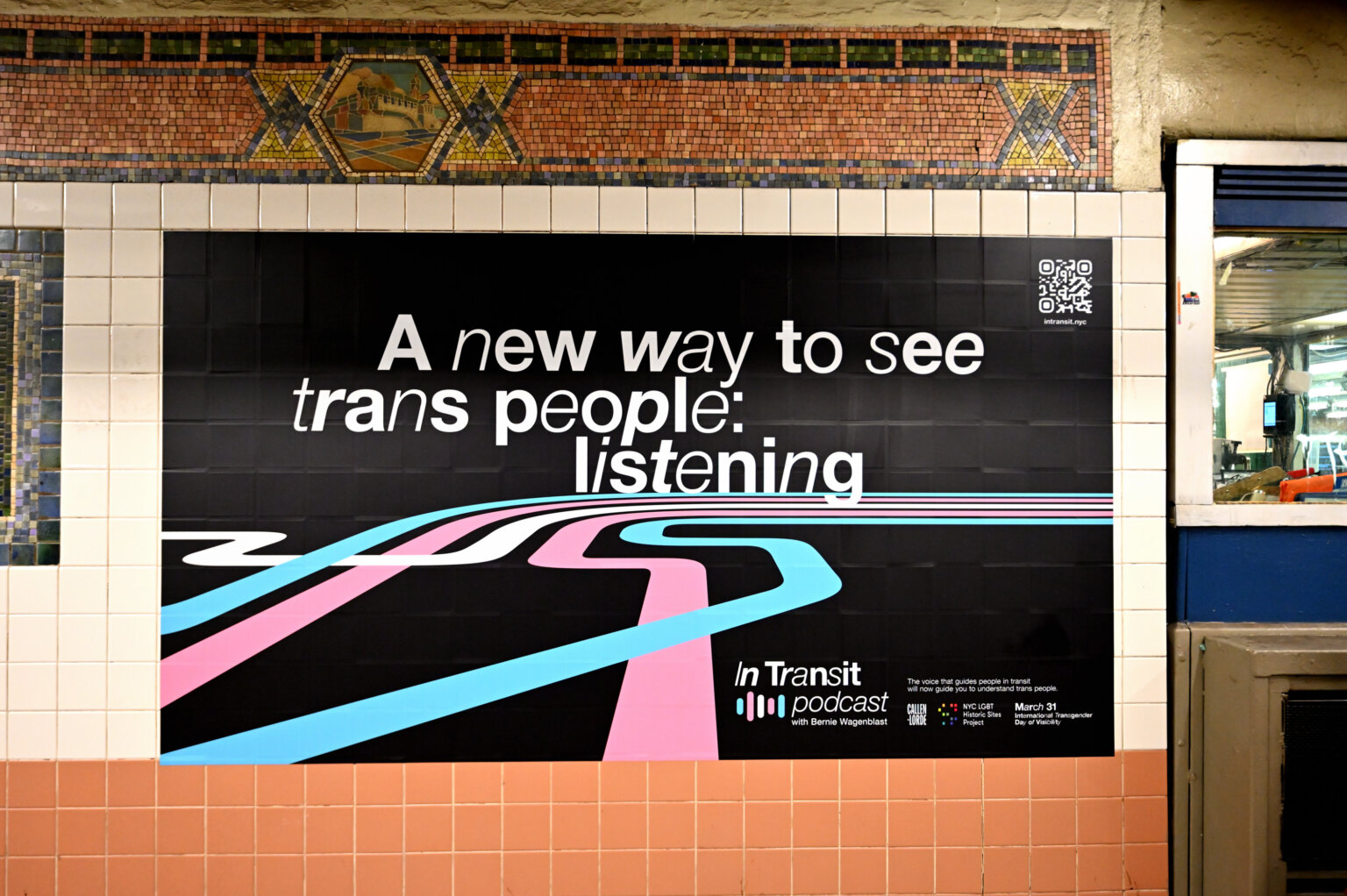
DONNA ACETO
Ken Lustbader, who is the co-director of the NYC LGBT Historic Sites Project, acknowledged that the announcement coincided with International Transgender Day of Visibility.
“As we recognize Transgender Day of Visibility, it’s crucial to also understand that trans people have always existed, making their own history as they pursue healthy, safe, and joyful lives,” Lustbader said in a written statement. “‘In Transit’ and the T Line have the power to introduce large numbers of New Yorkers to place-based trans history, right here in their own city. From the 19th century residence of Murray Hall to medical offices where ground-breaking care was provided as early as the 1940s, these extant sites allow for a visceral connection to an often overlooked history.”
Patrick McGovern, the CEO of Callen-Lorde Community Health Center, stressed the importance of the visibility campaign in the face of transphobia across the country.
“The resilience of the trans community has paved the way for LGBTQ+ rights across the country, and their stories deserve to be amplified and celebrated,” McGovern said. “At a time when LGBTQ+ healthcare is under attack, Callen-Lorde is proud to serve as a safe haven for queer and trans people who need knowledgeable and welcoming healthcare–as we have for more than 55 years.”
